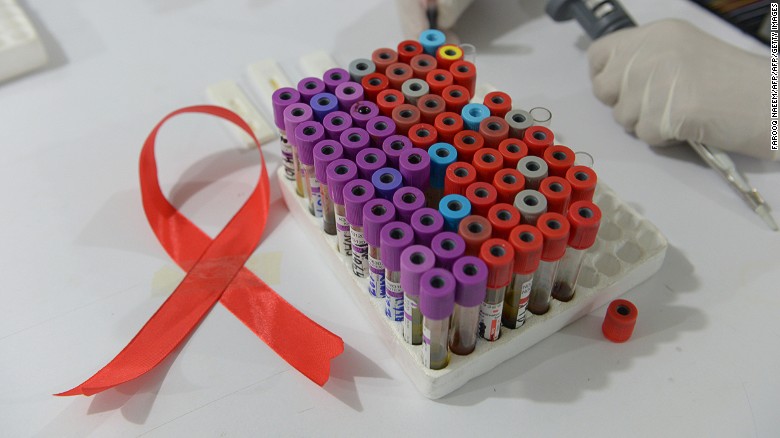Moderna starts trials for HIV vaccine in humans 1:37
(CNN) --
An American woman has become the third known person to go into remission from HIV, and the first mixed-race woman, thanks to an umbilical cord blood stem cell transplant, according to research presented at a conference on Tuesday.
The woman, whom researchers described as middle-aged and of mixed race, was diagnosed with acute myeloid leukemia four years after an HIV diagnosis, according to an abstract from the Conference on Retroviruses and Opportunistic Infections.
Injectable drug against HIV approved 1:11
After the diagnosis of leukemia, he received high doses of chemotherapy that destroyed his blood cells.
Later, she received a stem cell transplant from an adult relative to replenish her own blood cell levels.
This served as a bridge to maintain her blood cells while she received stem cells through the umbilical cord blood of an unrelated newborn, which can take up to a month to start producing cells.
The cord blood had a mutation that makes the cells resistant to HIV infection.
A little more than 40 years ago, the first cases of AIDS were recorded in the United States.
Just over three years after her 2017 transplant, she stopped taking anti-HIV drugs, known as antiretroviral therapy, and 14 months later she had no detectable virus.
According to Dr. Marshall Glesby, associate chief of the Division of Infectious Diseases at Weill Cornell Medicine and a member of the research team, the advantage of using umbilical cord blood is that it is drawn from a national repository that allows scientists to identify the blood with the HIV-resistant mutation.
Rare case of HIV control in Argentina 1:12
This was also the mutation involved in the two other known cases of HIV cure in people who received stem cell transplants.
advertising
This mutation is predominantly found in people of Northern European descent, limiting the ability to transplant to non-white people.
However, although the patient in this study identified as mixed race, she was still a transplant match, indicating a larger pool of potential transplant recipients from diverse racial backgrounds.
Umbilical cord blood does not need to be as closely matched as stem cells from an adult donor.
"So [umbilical cord blood] would potentially be more available to people who need a transplant and who have HIV, because of this lack of need for such a rigorous comparison," Glesby told CNN.
Dr. Yvonne Bryson, chief of pediatric infectious diseases at the David Geffen School of Medicine at UCLA and the study's principal investigator, said one man initially included in the study died of cancer recurrence before its results could be evaluated. .
The woman has also been in remission from cancer for 4 1/2 years.
She did not have graft-versus-host disease, when donor cells attack recipient cells after a transplant, unlike the two other people cured of HIV.
Those previous experiences had led researchers to assume that graft-versus-host disease was important for a cure.
But the woman's case refutes that, Glesby said.
However, the researchers caution that this development applies only to a small fraction of people with HIV.
About 50 people a year with HIV and blood cancer may benefit from this approach, according to Bryson.
Glesby agreed: "This is not the kind of treatment that would be appropriate for someone who doesn't have a medical need to have a transplant."
This type of transplant can be fatal in up to 20% of people, she said, or can cause other health problems.
Why is there still no HIV vaccine?
1:03
"This person had an underlying disease that required a stem cell transplant, so I don't want people to think that now this is something that can be applied to the 36 million people living with HIV," Dr. Anthony Fauci, director of the National Institute of Allergy and Infectious Diseases, in an interview on the radio show "Conversations on Health Care."
"It's not practical to think that this is something that will be widely available."
CNN's Michael Nedelman contributed to this report.
stem cellsHIV









